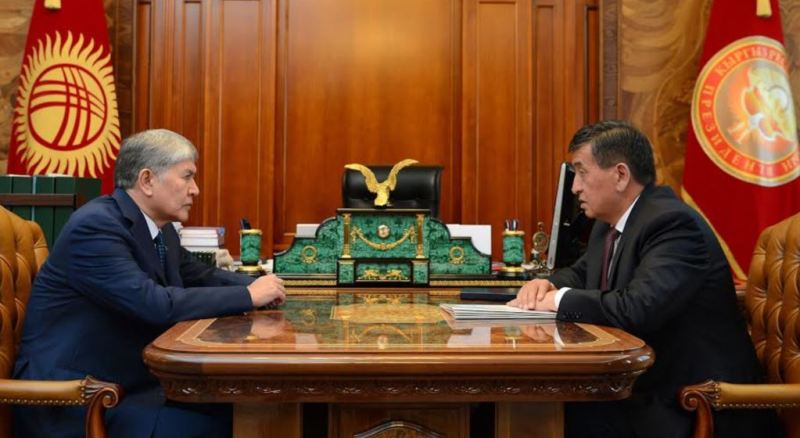The Kyrgyz Elite Chose the Current President
In last year’s presidential election, former Kyrgyz President Almazbek Atambayev nominated Sooronbay Jeenbekov on behalf of the Social Democratic Party. Jeenbekov was a close friend of Atambayev when he worked for almost a year as prime minister until he became president. However, after he became president, he began to pursue his own policies and prevent the suicide, as he described the informal co-ordination policy of the former president. As a result, tension rose between the current president and the former president. The former leadership of the former president was left to choose one of these two politicians and the division took place. In April, Atambayev announced his return to the political arena and was elected head of the Social Democratic Party, and the party was split into two parts and has not yet united.
President Jeenbekov has used his presidential powers to dismiss many of Atambayev’s officials and arrest some of them. So far, he has exposed a number of major corruption offences that occurred during the period of Prime Minister Sapar Isakov, and then arrested Isakov himself. Later in Moscow, Ikramjan Ilmiyanov, who was promoted from his job as president Atambayev’s driver in his time to a leading post in the Atambayev presidency, was arrested and then taken to Kyrgyzstan.
As of September, this year, the bill to remove the immunity enjoyed by the country’s former presidents has been legitimized, and Atambayev was forced to fire back because all these actions were carried out against the former president, i.e. against him. Last November, Atambayev held a private interview on April TV channel, saying he is in opposition to the authorities. Accordingly, President Jeenbekov invited former prime ministers of Kyrgyzstan to the negotiating table and encouraged them to evaluate the ongoing processes and play an active role in the political life of the country. That is, President Jeenbekov realizes that within a year, he could not form a leadership group with his brothers and other relatives, so he announced his decision to unite with the elite and strengthen his authority through them. The People’s Congress (kurultai), which was announced on 24 November, was transformed into the interests of the elite in power, not to the interests of the opposition.
The elite has shown itself to be a constructive opposition, but in fact has demonstrated its claws and influence over the president. The People’s Conference had rated the President’s performance for one year as satisfactory, but considered all the activities of the former President unsatisfactory. In order to prove that it is a constructive elite, a probationary period for the current President Jeenbekov was announced until April 2019. During this time, the President must establish a mechanism to address the country’s political, economic and financial problems. The elite must also make sure that their personal property remains in the country far from being investigated.
In other words, the elite is a remnant group of the Soviet Union, who have become rich by plundering the country’s wealth. In his remarks, Atambayev tried to prove that he had earned all his disclosed assets legally through private companies, which are worth billions of dollars. It seems that the cleaning process will start from the old political officials after revealing the obvious economic violations they committed, and thus with withdrawing immunity from former presidents, the main expected goal to be is the Atambayev’s team.
In short, the country’s political elite is showing itself as defending the interests of the people. They are trying to strengthen their capabilities in society by building confidence for the current president among people. Neither the present nor the next president will be able to improve the situation of the country and the people, because politics is exercised only by large groups of elite representatives, not the presidents. Whereas, the elites themselves demand that the president defend their interests. This is the nature of the capitalist system, and the state will always be a tool to serve the interests of the leadership group (the capitalists), and it cannot contradict the interests of the leadership group, even though it fights corruption or other crimes, because the leading group will try to strike it with the help of people if possible, from the president or authorities. So, any president is also responsible for dealing with this corrupt group, acting with it, and serving it.
Therefore, reforms in Kyrgyzstan will not be achieved through the elimination of differences between presidents, but through a radical change of regime. This means that the world’s system of Kufr (the capitalist ideology) must be replaced in its entirety. Kyrgyzstan is one of the weakest countries in international politics, a colonial state that pursues foreign policy under the rule of the world’s Kufr system and its standards. None of us will succeed except through the Islamic ideological struggle, the only force that can bring about internal political revolutions in our country, because it is important to hold Islam as an ideology against the Kufr ideology.
It is important to make it clear to the public that we are able to fill every gap with Islamic rulings. Otherwise, the Ummah will not be aware of the ability of Islam to replace Kufr, and therefore the Ummah will not trust the power of Islam. Given that the Ummah is the fundamental force in the transformation of society, its faith is certainly a conclusive and decisive force.
Media Office of Hizb ut Tahrir in Kyrgyzstan
Monday, 10th Rabii’ II 1440 AH
17/12/2018 CE
REF: 1440 / 01

